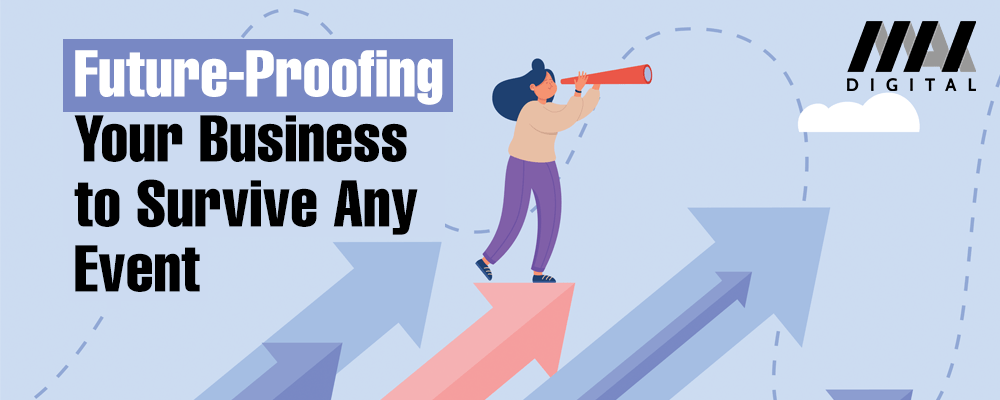
If there’s anything the past three years have taught us, it’s that unpredictable events can disrupt every aspect of human life without sparing any sector or industry. The pandemic showed us that even the transport and food industries that seem untouchable can crack under pressure. The events changed consumer behavior, and many businesses struggled during and after the pandemic because they didn’t have a sustainable future-proofing strategy. In fact, many small businesses, especially brick-and-mortar businesses, shut down because they couldn’t survive in the new digital terrain. Well, once beaten, twice shy, and who knows what’s coming next? While you can’t totally prepare for all future risks and events, you can do your best to mitigate them by future-proofing your business.
What is Future-Proofing?
Future-proofing is a concept businesses and organizations implement as a strategy to help them survive unforeseen circumstances that would otherwise disrupt their business. Future-proofing as a strategy entails a business’ ability to calculate and anticipate future risks and events using available data and industry trends. It is a continuous process whereby companies keep preparing for the future by implementing necessary measures to reduce the impact of disruptive future events on their brand and business model.
5 Proven Ways to Future-Proof Your Business
Unless you were in the health and sciences industry or were an established business with a big budget to spend on research and discovery, you couldn’t have predicted COVID-19. Try not to focus too much on accurately predicting future events that can disrupt your business. Instead, prepare for all kinds of unforeseen circumstances by giving your business what it needs to stand the test of time, even the tough times.
Save for Rainy Days
The saying; “save for the rainy days” is true all around, and some might say especially in business. Many giant companies in the past have been carried away with the boom they were enjoying that they forgot to prepare for the future. While your business is enjoying a boom, raise funds, invest in budding talents, invest in diversity, and expand your reach. Perhaps Yahoo didn’t fail because it didn’t save for the rainy days, but it could have helped if it had been like Google and expanded to other regions and invested in diverse talents. Maybe, like Google, Yahoo could have launched better products that could have kept it on top of the game.
Practice Agile Methodologies
You might have heard how San Francisco techies use agile methodologies to build startups and raise millions of dollars in funding in under five years. Many believe that only startups and large firms can benefit from using agile methodologies, but that is misleading. All businesses, on-site and online, can take advantage of agile methodologies to keep up with the ever-changing consumer and industry trends.
A company is agile if it has a culture of fast response to changes and continuous iterations in order to meet the needs of the customer base and remain profitable. According to McKinsey & Company, organizations that were agile during the pandemic outperformed their rivals who were not. Depending on your business model, you may not be able to practice wholesome agile methodologies, but a conscious effort to stay agile will make a big difference. You can enroll in free courses or read about the agile framework to discover ways to make your business agile. A company can be agile if the leadership and employees practice agile methodologies.
Be Tech Savvy
Whatever happens in the future, you can be sure that there will be technological solutions to help humanity (and businesses) manage. During the pandemic, many businesses transitioned into the eCommerce space to keep afloat, and they had to learn digital tools and technologies to operate their business online. If you have any experience running a business in the eCommerce industry, you’d know that it’s a fast-paced environment with tight competition. Not to mention that eCommerce buyers have high technological expectations for eCommerce brands. For example, a brick-and-mortar business may never need technologies such as AI, AR/VR, and fraud detection SaaS, but we can’t say the same for eCommerce businesses.
Keep up with technology trends, so that everything doesn’t seem all too strange if you ever have to rely on new technologies to keep your business afloat.
Continuous Learning
As a small business, you may not have enough funds for research and discovery, but what you can do is have a mindset for continuous learning. As the leader of your business, you should have an open mind and be willing to learn new skills that fill sudden voids. You should be able to wear many hats and take up roles should the need arise. Additionally, encourage your employees to learn new skills by setting aside personal development and learning fund to enroll them in courses that can improve their skills and productivity.
As with everything in the world, external decisions outside of your control can impact your business. For instance, external decisions, such as the government’s decision to increase data privacy. Six years ago, companies had more access to consumer data, even up to a point where some became notorious for their aggressive strategies for acquiring consumer data. Now, customers can opt out of sharing their data with businesses. Businesses must discover other ways to provide personalization features and functionalities and create personalized marketing strategies without relying on consumer data. Companies that don’t keep up with industry trends are probably still struggling to manage with restricted access to consumer data.
Keep up with consumer behavioral trends, market trends, new industry standards, government policies, regulations, and lots more. You never know what new law can pose a risk to your business.
Be Adaptive
Being tech-savvy and having a mindset for continuous learning can’t help future-proof your business if you are not adaptive. One of the reasons why BlackBerry didn’t survive the smartphone operating system war was that the company didn’t prepare for the future when they were at the top of the game. BlackBerry couldn’t adapt, and it became obsolete.
To summarize, here are five proven ways to future-proof your business;
- • Save for rainy days
• Practice agile methodologies
• Be tech-savvy
• Continuous learning
• Be adaptive






